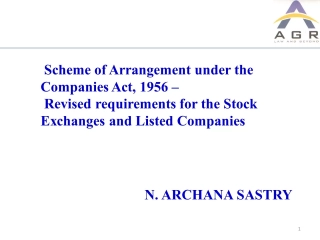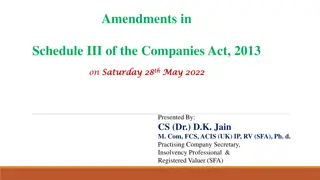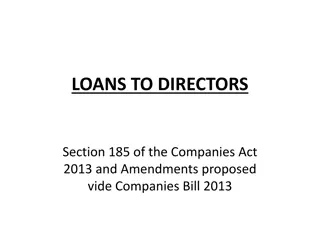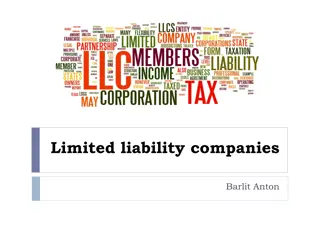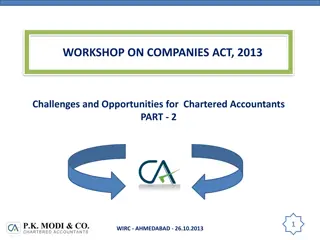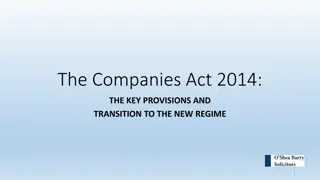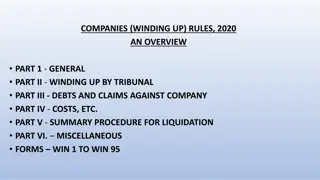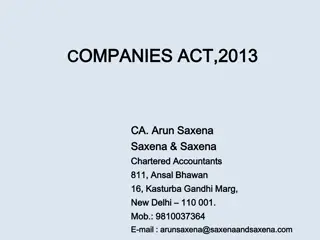Scheme of Arrangement under the Companies Act, 1956
The changes introduced in the existing procedures for stock exchanges and listed companies regarding the scheme of arrangement under the Companies Act, 1956. It covers the submission of draft schemes, display on websites, changes in internal procedures, court process, approval of shareholders, and i
4 views • 16 slides
Important Provisions of Companies Act Regarding Audit
The Companies Act mandates specific provisions related to audit, including the appointment of auditors, consent, certificates, and rotation requirements. Companies need to appoint auditors timely, obtain consent and eligibility certificates before appointment, and adhere to mandatory auditor rotatio
2 views • 22 slides
Buyback of Shares in India under Companies Act & Tax Consideration
Explore the intricacies of share buybacks in India, from regulatory compliance under the Companies Act to tax considerations under the Income-tax Act. Discover how companies navigate legal frameworks to optimize surplus cash, enhance shareholder value, and strengthen promoter holdings through strate
6 views • 4 slides
Blog 2- Unveiling the Top RPO Companies in the USA_ Elevate Your Recruitment Strategy
In the competitive landscape of talent acquisition, companies are increasingly turning to Recruitment Process Outsourcing (RPO) providers to streamline their hiring processes and gain access to top talent. With a myriad of RPO companies in the USA, it can be challenging to identify the best partners
6 views • 2 slides
Recent Amendments in Companies Act, 2013: An Overview
The Companies Act, 2013, a significant legislation in India, underwent amendments to enhance corporate governance and compliance. Passed in 2012, the Act regulates aspects of corporate entities, fostering transparency and accountability. The amendments aim to adapt to evolving business landscapes an
0 views • 123 slides
Significant Amendments in Schedule III of the Companies Act, 2013
Schedule III of the Companies Act, 2013 has been amended to include instructions for the preparation of financial statements for different categories of companies. Key changes relate to rounding off figures based on total income, definition of turnover, and disclosure requirements for shareholding o
0 views • 29 slides
Understanding Redemption of Preference Shares in Companies
Preference shares in companies offer preferential rights in dividend payments and capital repayment during liquidation. Redemption of preference shares involves returning the preference share capital to the shareholders. This process requires adherence to specific provisions under the Companies Act,
0 views • 25 slides
Understanding Implications of IG Empowerment Act and Paperwork Reduction Act
The IG Empowerment Act provides beneficial provisions for Inspector Generals (IGs) such as exemptions from certain acts, including the Computer Matching Act and Paperwork Reduction Act. The Paperwork Reduction Act requires federal agencies, including IGs, to obtain OMB clearance before conducting su
1 views • 25 slides
Understanding Baby Dumping and the Child Care and Protection Act of 2015
Baby dumping, the act of abandoning infants, is a serious issue addressed by the Child Care and Protection Act of 2015 in Namibia. This Act provides safe options for anonymously leaving children to prevent harm or death. Abandoned children are placed in temporary care until claimed or available for
0 views • 13 slides
Banking Regulations in Bangladesh: A Comprehensive Overview
The Bangladesh Bank Order of 1972 established the central bank, Bangladesh Bank, which regulates banking activities under the Bank Companies Act of 1991. This legislation, along with the Financial Institutions Act of 1993, sets the framework for overseeing bank companies and non-banking financial in
2 views • 27 slides
Understanding Different Types of Companies in Business
Explore the various kinds of companies in the business world, including statutory companies, registered companies, private companies, public companies, and more. Learn about the differences between private and public companies, statutory company examples like LIC and RBI, and the characteristics of
0 views • 25 slides
Overview of Finance Act 2019 and Its Business Implications
The Finance Act 2019, signed into law in January 2020, aims to promote fiscal equity, align tax laws with global practices, introduce tax incentives, support small businesses, and raise revenue. It made significant changes to tax laws affecting companies, VAT, personal income tax, capital gains tax,
0 views • 22 slides
Understanding the Role of a Board of Directors and Company Secretary in Corporate Governance
Strong corporate governance is crucial for business performance, as it involves the system of rules, practices, and processes that direct and control a company. In Uganda, the Companies Act of 2012 governs corporate governance, with a voluntary code for private companies and mandatory for new public
1 views • 21 slides
Insights into the Biotech Industry: Companies, Key Players, and Career Pathways
Keith Ho's career journey from a scientist to a digital health expert at Biogen is highlighted. The overview covers the definition of biotech, the concentration of biotech companies in the US, and the global distribution of such companies. Additionally, key insights into the top biopharma companies
0 views • 9 slides
Proposed Changes in Company Regulations under The Companies Act
The proposed changes under The Companies Act include redefining terms like "significant influence" and "joint venture," aligning accounting years for associate companies, modifying the definition of net worth, and more. These revisions aim to enhance clarity and efficiency in corporate regulations.
0 views • 50 slides
An Overview of Different Types of Companies and Their Characteristics
Explore the various kinds of companies based on mode of incorporation, number of members, liability of members, and more. Learn about statutory companies, registered companies, private companies, and the distinctions between different types of companies in the business world.
0 views • 25 slides
Understanding Charges and Registration according to Companies Act, 2013
This comprehensive content covers the concepts of charges, registration of charges, fee structures, and penal provisions as per the Companies Act, 2013. It explains the duty of companies, fee structures for charges created before and after specific dates, and the importance of timely registration to
0 views • 12 slides
Understanding the Impact of the Insurance Act 2015 on Brokers and Insurers
The Insurance Act 2015 brings significant changes in insurance contract law, shifting from Duty of Disclosure to Fair Presentation. This Act influences both Brokers and Insurers, requiring clear and accessible disclosure of material circumstances. The remedies for misrepresentation and non-disclosur
0 views • 19 slides
Understanding Charges and Mortgages in Property Transactions
According to the Transfer of Property Act and Companies Act, charges and mortgages play significant roles in property transactions. This content explains the definitions of charges and mortgages, their distinctions, registration requirements, and the duty of companies to register charges. It covers
0 views • 22 slides
Disqualification and Vacation of Office of Directors in Companies Act, 2013
Directors play a crucial role in companies per the Companies Act, 2013. They must adhere to specific qualifications and can face disqualification under Section 164, such as being of unsound mind, insolvent, convicted of offenses, or failing to comply with court orders. Understanding these regulation
0 views • 42 slides
Characteristics of Companies in the Care Sector
Companies operating in the care sector exhibit distinct characteristics, such as financial prioritization, control by financial experts, and reliance on technology. Large care chains engage in takeovers and have offshore accounts, while smaller companies face asset stripping and profit maximization
0 views • 5 slides
Overview of IFRS Implementation in Japan
The overview of IFRS implementation in Japan includes the voluntary and mandatory phases, benefits for companies, challenges faced during implementation, and future plans for mandatory adoption. The process involves transitioning from Japanese standards to IFRS, with a focus on reducing funding cost
1 views • 16 slides
Understanding Section 185: Prohibition on Loans to Directors in Companies Act 2013
Section 185 of the Companies Act 2013 prohibits companies from directly or indirectly providing loans, guarantees, or securities to their directors or related persons. The rationale behind this regulation is to prevent misuse of public funds, siphoning off money, and securing personal gains. This se
0 views • 22 slides
Practical Aspects of Strike Off and Restoration of Companies by CS Ashish O. Lalpuria
This presentation discusses the practical aspects of striking off and restoring companies based on analysis of case laws from NCLT and NCLAT. It covers types of strike off, companies that cannot be struck off by ROC, and the process of strike off by the Registrar of Companies. Various scenarios and
0 views • 44 slides
Overview of Limited Liability Companies under Polish Company Law
Explore the legal aspects of limited liability companies under the Polish Commercial Companies Code, detailing formation, share capital requirements, shareholder liabilities, and powers granted to these entities. Learn about the two main types of companies in Polish law, their characteristics, and k
0 views • 13 slides
The Foundations of the Separation of Powers in Companies
The separation of powers in companies is based on the dualism of organs: the Board and General Meeting. The actual situation in companies diverges between large public companies with autonomous management and smaller private companies with owner-operators. The search for the foundations of the separ
0 views • 15 slides
Types of Companies in Corporate Administration
This article discusses the various kinds of companies in corporate administration, including incorporated, chartered, statutory, and registered companies. It covers the definition of a company, different types of legal entities, and examples of each type. The classification of companies based on inc
0 views • 17 slides
Efic: Specialist Financing Solutions for Australian Companies
Efic is a specialist financier owned by the Australian Government, providing creative financing solutions to help Australian companies succeed globally. They offer various financial instruments like bonds, guarantees, and loans to assist companies in winning contracts and expanding internationally.
0 views • 11 slides
Corporate Transparency Act (CTA) Beneficial Ownership Reporting Requirements
The Corporate Transparency Act (CTA) mandates companies to report information about their beneficial owners to FinCEN starting January 1, 2024, to combat illicit activities. Reporting companies include U.S.-based corporations, LLCs, and foreign companies registered to do business in the U.S. Exempt
0 views • 10 slides
Impact of Corporate Transparency Act on Businesses
The Corporate Transparency Act (CTA), part of the Anti-Money Laundering Act of 2020, aims to prevent money laundering and other illegal activities by disclosing beneficial owners of US entities. The act mandates reporting companies to provide ownership information to the US Treasury's FinCEN. Exempt
0 views • 37 slides
Understanding Borrowing Powers of Companies under Companies Act, 2013
The term "Borrowing" in the Companies Act, 2013, pertains to the power granted in Section 180(1)(c) for companies to borrow money with the consent of the company by a special resolution. This includes provisions on limits, definitions of temporary loans, necessary board resolutions, and validity of
1 views • 8 slides
Challenges and Opportunities for Chartered Accountants under Companies Act, 2013
Explore the various penalties and punishments for defaults under the Companies Act, 2013 as discussed in a workshop held on 26th October 2013 in Ahmedabad. The session covered offenses such as misleading statements in prospectuses, fraudulent inducements, and fictitious applications for securities,
0 views • 33 slides
Companies (Cost Records and Audit) Amendment Rules 2014 Overview
The Companies (Cost Records and Audit) Amendment Rules 2014, presented by CMA Harshad S. Deshpande, cover the applicability of cost records and cost audit for companies in regulated and non-regulated sectors. The rules specify the class of companies engaged in production or services that must mainta
1 views • 41 slides
Transitioning to The Companies Act 2014: Key Provisions and Changes
The Companies Act 2015, enacted on June 1, 2015, consolidates existing company laws from 1908 to 2013 into a single unified body of legislation. This comprehensive act aims to simplify company law, modernize corporate governance, and reduce administrative burdens. Companies need to decide on suitabl
0 views • 29 slides
Exemptions and Changes in Company Laws Act 2015
The Companies Exemptions Act of 2015 brings significant changes to company laws, such as the withdrawal of minimum paid-up capital requirements, optional use of common seals, and eased regulations on related party transactions. Private companies are granted exemptions from various provisions, allowi
0 views • 20 slides
Recent Case Laws in Corporate Laws - Economy Hotels India Services Pvt. Ltd. v. Registrar of Companies & ANR. (NCLAT)
In this case, Economy Hotels India Services Pvt. Ltd. filed a petition under Section 66 of the Companies Act for confirming the reduction of share capital. The National Company Law Tribunal (NCLT) rejected the application, but the National Company Law Appellate Tribunal (NCLAT) allowed the reduction
0 views • 21 slides
The Civil Rights Act of 1964 and the Supreme Court
In the 1960s, Congress passed the Civil Rights Act of 1964, a pivotal legislation that prohibited discrimination in public accommodations. This act represented a significant shift in focus towards minority rights. The Supreme Court's past rulings on the Civil Rights Act of 1875 influenced Congress t
0 views • 24 slides
Understanding Growth Companies and Growth Stocks
Differentiating between good companies and good investments, this content delves into the intrinsic value versus market value of stocks, the characteristics of growth companies and growth stocks, and how stock prices can be undervalued or overvalued in the market due to incomplete information. It em
0 views • 38 slides
Companies (Winding Up) Rules, 2020: An Overview
The Companies (Winding Up) Rules, 2020 provide guidelines for winding up a company by the Tribunal under the Companies Act, 2013. The rules cover various aspects such as modes of winding up, circumstances under which a company may be wound up by the Tribunal, definitions, forms, and more. It specifi
1 views • 110 slides
Overview of Oppression and Mismanagement Provisions under Companies Act, 2013
This content provides detailed information about the provisions related to oppression and mismanagement as per the Companies Act, 2013. It outlines the eligibility criteria for members of shareholders to raise concerns, the power of the tribunal to intervene, and the possible orders that can be pass
0 views • 6 slides
